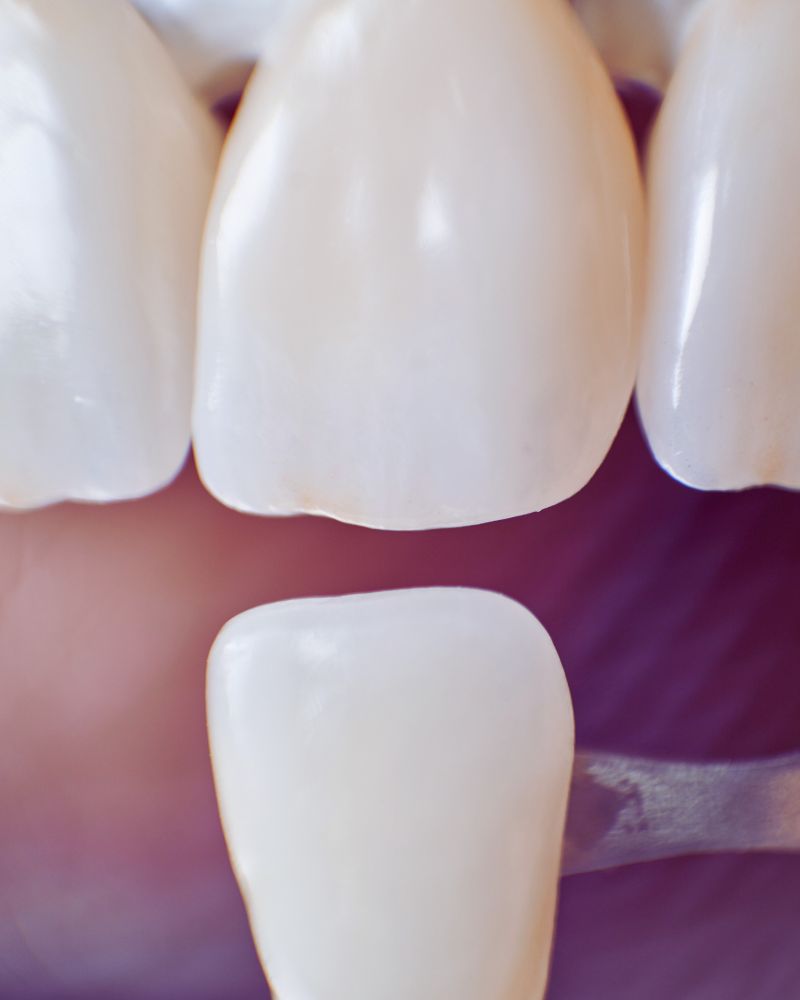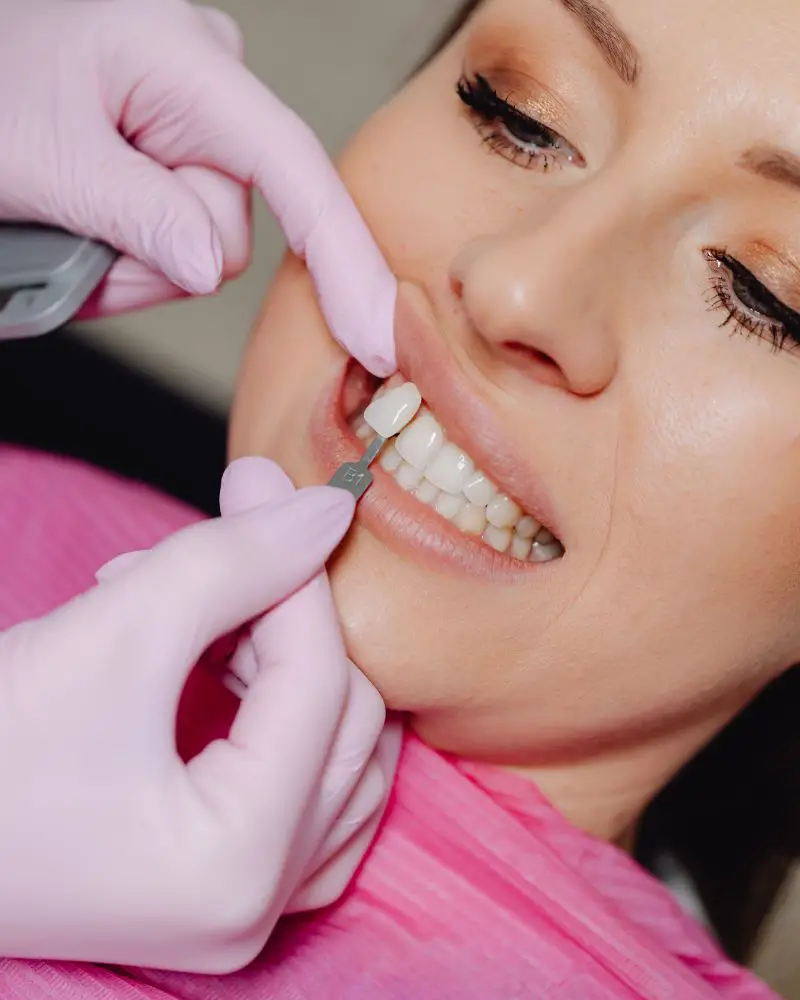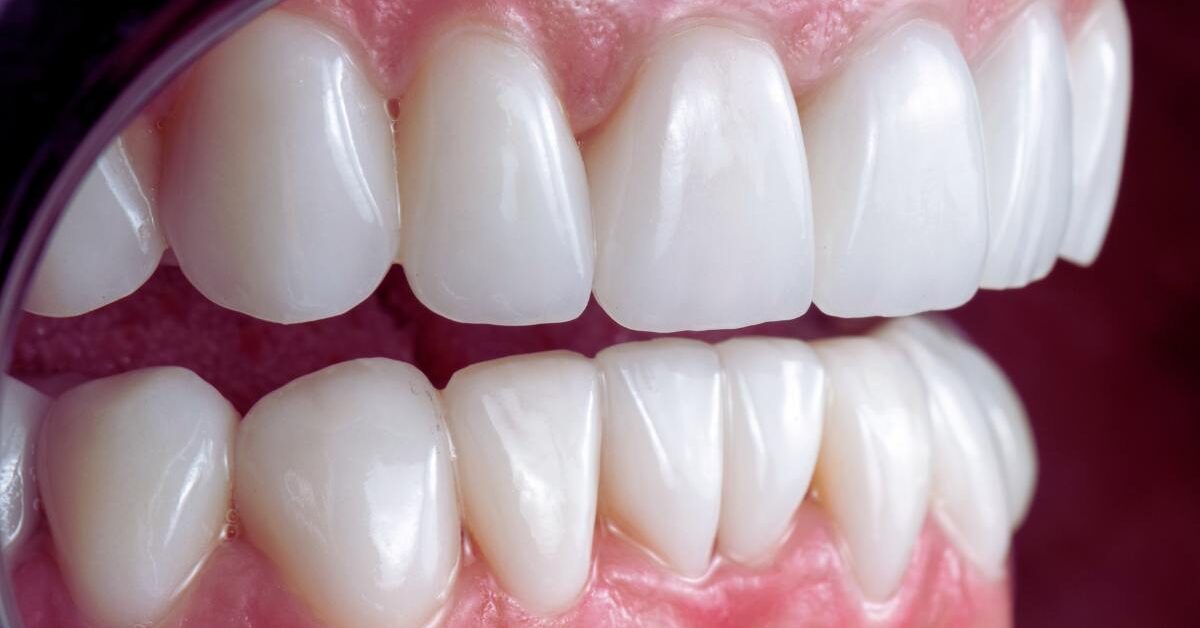As an Amazon affiliate, I may earn from qualifying purchases. Please read our Disclaimer and Privacy Policy.
Are dental veneers bad for your teeth? Dental veneers are a popular cosmetic dental treatment for people who want a whiter smile. In fact, I’m scheduled for veneer prep at the end of this month.
I’m getting two veneers put on my front two teeth because they are starting to wear with age. I also want to close the gap between my two front teeth and, of course, having a white smile is always a nice benefit.
When I tell people I’m getting veneers, I get mixed reviews.
Many people wonder if they’re bad for your teeth. The short answer is no. Of course, there are a lot of factors to consider before making a decision. A reputable dentist will tell you whether you are a good candidate or not.
There are a lot of myths about veneers that, up until recently, I thought were true. In this post, I’ve debunked those myths with solid research. Since I’m getting them soon, I thought it was important to get a better understanding of what’s about to happen.
If you’re thinking of getting veneers, this post may help with your decision.

Disclaimer
While I’ve taken the time to research this blog post, it’s not meant to be a substitute for a consultation with a qualified professional. Advances in dental technology change over time. Please consult with your dental professional for the most up-to-date advice on veneers and whether they are right for you.
What Are Veneers and Are Veneers Bad For Your Teeth?
The two types of veneers that are most popular include porcelain and ceramic.
Porcelain veneers, also known as tradition veneers, are designed to last up to 15 years or more. They’re less likely to chip than other types. However, they can be repaired if they do.
You can get porcelain veneers in the following forms:
- Stacked ceramic
- Pressed ceramic
- Lithium Disilicate
- Zirconia
Procelain veneers are made to measure and cemented onto the tooth surface. Same-day veneers and no-prep veneers are available, but may not be suitable for everyone.
Traditional veneers usually need two appointments. One appointment is scheduled to prepare the tooth (or teeth) and take an impression. The second appointment is to cement the veneer onto the tooth.
Either type of veneer (ceramic or porcelain) will provide you with a radiant and more uniform smile.
There are, however, specific benefits to each type. For example, composite veneers can be applied in one visit, are less expensive, and are easier to repair if needed.
Porcelain veneers, on the other hand, tend to last longer than composites, don’t change color over time, and have the appearance of real teeth.
Will I have to go home with filed down teeth?
Before the dentist can apply your veneers, a small amount of enamel has to be filed down for a proper fit. Your dentist, however, will fit you for temporary veneers until your permanent ones are created.
You may also be happy to know that only a small amount of enamel is removed. In fact, only 0.3 mm needs to be filed in some situations. Others may need up to 1 mm filed away.
Does it hurt to get veneers?
As with many dental procedures, you will get a local anesthetic for pain control. The only pain you should feel is the initial prick of the needle for freezing. After that, you wo’t feel any pain during the procedure.
Understanding the Veneer Application Process
The first step in the process of getting veneers is through a consultation with your dentist. If you’re considered to be a good candidate, the next step will involve tooth preparation.
For this step, a thin layer of enamel will be filed down so that the veneers can be attached. If required, you may need to visit a lab for custom colorization.
The dentist will then make an impression of your teeth using either a 3D digital scanner or soft putty in a tray. Temporary veneers may be placed at that time.
The final part of the process is the actual bonding. This is when your permanent veneers are ready to be attached. Your dentist will use a strong dental glue to secure them.

Pros and Cons of Veneer Application
There are pros and cons with most elective dental procedures. Keep in mind that not everyone is a good candidate for veneers. In some cases, dental implants may be a better option. This could be true if you have periodonatal disease.
If you think you might be a candidate for dental implants, or just want more information on them, read Are Dental Implants Worth It? 5 Pros and Cons.
Pros:
- They look very natural
- They can correct worn, chipped, discolored, or fractured teeth
- Your smile can be changed completely in a short period of time
- Porcelain veneers can last up to 15 years. Composite veneers have a shorter longevity at about seven years.
Cons:
- They tend to be expensive
- Although strong, they can become damaged through teeth grinding, eating hard foods, etc.
- The process is permanent due to the structural filing of the tooth structure
- You may not be a candidate if you have active periodontal disease or weakened teeth.
- Tooth sensitivity may occur, although it should only last a few days
Are You a Good Candidate For Veneers
Not everyone is a good candidate for veneers.
If you have poor dental hygiene, significant tooth decay, or severe dental problems, alternative treatments like dental crowns might be a better option.
In addition, you may not be a good candidate if you have:
- severly misaligned teeth
- suffer from severe teeth grinding
- don’t look after your teeth properly
If you do have misaligned or crooked teeth, your dentist may suggest braces. That may not be an issue for younger folks, but if you’re over 50 you might want to read Can I Get Braces Over 50? 7 Health Issues That May Stop You.
9 Biggest Myths About Dental Veneers and Who Can Get Them
1. Veneers Look Fake and Unnatural
Modern veneers are custom-made to match the color, shape, and size of your natural teeth. When done by an experienced cosmetic dentist, they blend seamlessly with your smile, looking completely natural.
2. Veneers Require the Removal of a Lot of Enamel
Only a small amount of enamel, often just a thin layer, is removed during the veneer application process. This is necessary to ensure a proper fit and a natural look, but it’s a minimal and controlled procedure.
3. Veneers Are Only for Aesthetic Purposes
While veneers are primarily a cosmetic treatment, they can also address functional issues like worn enamel, minor misalignments, and small gaps between teeth, improving both the appearance and function of your smile.
4. Veneers Are Prone to Staining
Porcelain veneers are highly resistant to staining, unlike natural teeth. With proper care, they can maintain their bright appearance for many years, even with the consumption of foods and drinks that typically stain teeth.
5. Veneers Don’t Last Long
High-quality veneers, especially traditional porcelain veneers, can last 10-15 years or even longer with good care, regular brushing, and routine dental check-ups.
6. Veneers Are Painful to Apply
The veneer application process is generally pain-free. Local anesthesia is used to minimize any discomfort during the preparation of your teeth, and most patients experience little to no pain afterward.
7. Veneers Damage Your Natural Teeth
Veneers are designed to protect your natural teeth. As long as they’re properly cared for and applied by a skilled dentist, they can actually help protect your teeth from further damage.
8. Veneers Are Only for Celebrities
Veneers are accessible to a wide range of people, not just celebrities. They are a popular option for anyone looking to improve their smile, regardless of their background or profession.
9. You Can Get Veneers on Any Tooth
Veneers are typically applied to the front teeth where they can enhance the appearance of your smile. They are not usually recommended for back teeth, as those are subject to more pressure and wear, making other treatments like crowns more suitable.

Making an Informed Decision
The best way to determine if veneers are right for you is to consult with an experienced cosmetic dentist, or your regular dentist.
Your dentist will assess your dental health, discuss the benefits of veneers, and explain any potential risks.
With proper care and regular dental check-ups, veneers can help you achieve a beautiful smile that lasts for a long time. They are not bad for your teeth when applied by a skilled dentist. As always, you should continue to maintain good oral hygiene after the procedure is complete.

